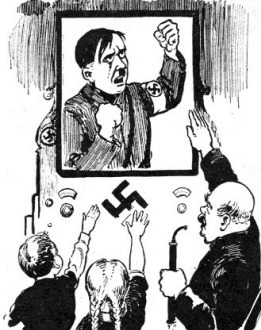Hitler Takes up Television
|
|
I am constantly amazed when reading stories about how easily Adolph Hitler rose to power in Germany by encouraging and exploiting resentment of his countrymen over being forced, among other concessions outlined in the Treaty of Versailles, to disarm militarily and make reparations for atrocities committed in World War I. Part of the Nazi (National Socialist) party success was extensive use of propaganda via print, radio, and the relatively new technology of television. Government exercised complete control over the mainstream media (i.e., not "underground") by dictating content that promoted the proclaimed virtues of Nazism and the Aryan race and the vices of just about every other form of government and race (particularly Jewish). At the height of Hitler's reign of terror during the Third Reich era, radio and television sets were only permitted to use crystals tuned to state-sponsored channels; to be caught possessing crystals for other frequencies meant certain death - often at the hands of the infamously cruel Gestapo. A large portion of the German population had no idea what the true status of the war was, and were taken completely by surprise when news of defeat finally came. "The Sound of Music" is an excellent film that depicts the beginning days of Hitler's proclaimed "peaceful" invasion of Austria, where he calmly assured the citizens that if they liked their country, they could keep their country (something about that kind of promise by a politician sounds eerily familiar). It is one of my favorite movies. Hitler Takes up Television
Within the past month, Radio-Craft has received a report that Chancellor Hitler is preparing a huge network of television stations in Germany which will probably be used as an aid to broadcasting as a medium for disbursing Nazi propaganda. As mentioned in the report; Hitler's plan includes the making of cheap television sets available throughout the country. This will make Germany the first nation to establish extensive television programs on a large scale. Short waves will be employed for these transmissions, so that the required number of channels can be obtained. In this way, with numerous stations properly spaced, it is expected that even the outlying districts will be adequately covered. Television transmitters manufactured by the Baird Television Co. of England are said to have been ordered by the German officials. These transmitters are of special design to cover the conditions required for each individual installation. They include sound facilities as well as the vision units, so that the voices of Hitler and his Nazi orators will be heard, in addition to visualizing the speakers, themselves. While no actual data is available regarding the type of receivers which will be merchandised, it is expected that only a single design, approved by the government, will be manufactured by all the manufacturers. This is in line with the present plan in Germany to make "Hitler's own" receiver (a set of small size, and relatively insensitive so that only local programs can be picked, up) the distinctive set. Thus, the citizens of Germany will be prevented from hearing the powerful transmitters of Russia and other foreign countries from which undesirable programs might be heard. A scene from "The Sound of Music" during the Nazi Anschluss in Austria. Treaty of Versailles The Treaty of Versailles was a peace treaty signed on June 28, 1919, that officially ended World War I between Germany and the Allied Powers. The treaty was negotiated among the Allied Powers, including the United States, Great Britain, France, and Italy, and imposed various penalties and restrictions on Germany. Under the terms of the treaty, Germany was forced to accept responsibility for causing the war and pay reparations to the Allies. The treaty also imposed military restrictions on Germany, limiting its army to 100,000 soldiers and prohibiting the development of certain military technologies. Some of the good aspects are:
Some of the bad outcomes are:
Overall, while the Treaty of Versailles had some positive aspects, its harsh terms and unintended consequences contributed to the instability and conflict that followed in the years leading up to World War II.
- See Full List - Anschluss "Anschluss" is a German term that refers to the annexation of Austria by Nazi Germany on March 12, 1938. This event was a key step in Adolf Hitler's efforts to expand Germany's borders and gain greater control over Europe. The annexation was achieved through a combination of political pressure, intimidation, and military force, and was met with little resistance from the Austrian government or the Austrian people. The Anschluss was widely condemned by the international community, but it set the stage for further German aggression and ultimately contributed to the outbreak of World War II. Despite these challenges, Arvin remained a significant player in the automotive audio market for many years. However, as the company faced financial difficulties in the latter part of the 20th century, it was eventually acquired by another company and the Arvin brand was discontinued. Today, Arvin is remembered as a pioneering brand in the field of automotive audio. Despite the challenges it faced and its eventual decline, its legacy continues to influence the industry and is still celebrated by many people who remember its products and the role they played in shaping the American automotive landscape. In conclusion, Arvin was a popular brand of car radios and audio equipment that was known for its quality and reliability. Although the company faced increased competition and eventually declined, its legacy continues to influence the industry and is remembered by many people today as a pioneer in the field of automotive audio.
Posted April 12, 2023 |
|

